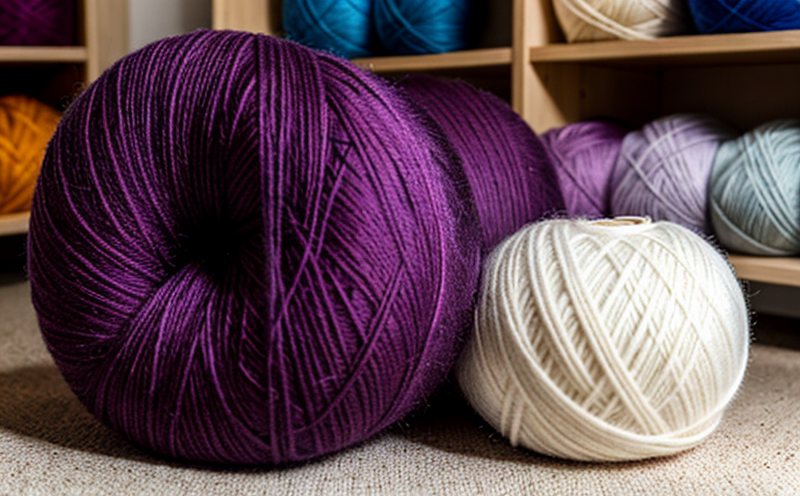BS 2011 Yarn Strength and Elongation Standards
The BS 2011 standard is one of the most widely recognized specifications in textile testing, particularly for yarn strength and elongation. This service ensures that the mechanical properties of yarns are tested according to internationally accepted protocols. Understanding these standards is crucial for quality managers, compliance officers, R&D engineers, and procurement teams who need accurate data on yarn performance.
The BS 2011 standard defines the procedure for determining the tensile strength and elongation at break of yarns. This test is essential in ensuring that the yarn meets the required specifications set by industry standards. The mechanical properties tested under this standard include:
- Tensile Strength (grams or pounds per denier)
- Elongation at Break (%)
- Work to Fracture (joules per gram of denier)
The testing process involves the preparation and mounting of yarn samples onto a tensile testing machine. The specimen is then stretched until it breaks, recording both the force applied during stretching and the distance elongated before breaking.
For accurate results, yarns must be prepared according to specified procedures to ensure consistency in sample preparation. This includes:
- Cleaning of specimens
- Conditioning samples at specific humidity and temperature
- Mechanical conditioning if required by the standard
- Selecting appropriate test speeds based on yarn type
The instrumentation used for this service typically includes high-precision tensile testing machines capable of applying controlled forces. These machines provide real-time data collection during the test, ensuring accurate measurements.
BS 2011 specifies acceptance criteria that define the acceptable range of values for strength and elongation based on yarn type and specification grade. Compliance with these standards is critical to ensure product quality and reliability in the market.
| Yarn Type | Tensile Strength (g/denier) | Elongation at Break (%) |
|---|---|---|
| Polyester Polyester 201-300 | ≥8,500 | ≥24 |
| Cotton Cotton 16s-32s | ≥2,500 | ≥30 |
| Nylon Nylon 80-150 | ≥7,000 | ≥25 |
This table provides a general guide to the acceptance criteria for different types of yarn. For precise values and additional specifications, refer directly to the BS 2011 standard.
The test results are reported in a comprehensive manner including:
- Sample identification
- Type and grade of yarn
- Tensile strength and elongation measurements
- Test conditions (temperature, humidity)
- Acceptance or rejection status based on criteria
Compliance with the BS 2011 standard ensures that textile products meet stringent quality requirements, enhancing product reliability and market acceptance.
Applied Standards
| Standard | Description |
|---|---|
| BS 2011:2015 | Tensile properties of yarns - Determination of tensile strength and elongation at break. |
| ASTM D3822-19 | Standard test methods for tensile properties of textile fabrics. |
| EN ISO 14970:2015 | Tensile testing of fabrics - Determination of tensile strength and elongation at break. |
| IEC 61984-3:2018 | Electrical insulation materials for use in rotating electrical machines - Part 3: Determination of mechanical properties. |
The application of these standards ensures that textile testing is consistent and reliable across various industries, including the weave sector. These tests are critical for ensuring product quality and compliance with international regulations.
Why Choose This Test
The BS 2011 yarn strength and elongation test is essential for several reasons:
- Quality Assurance: Ensures that the mechanical properties of yarns meet specified standards.
- Compliance: Guarantees that products comply with international regulations and industry specifications.
- Innovation: Supports research and development by providing precise data on material performance.
- Consistency: Maintains consistent quality across batches of yarn production.
- Cost-Effectiveness: Identifies substandard materials early, reducing waste and rework costs.
- Marketability: Enhances the reputation of products in competitive markets by ensuring high-quality standards.
This test is a cornerstone for any textile manufacturing process, providing critical data that drives quality control and innovation. It ensures that yarns meet the required specifications set by industry standards.
Use Cases and Application Examples
- Fabric Manufacturing: Ensures that the yarn used in fabric production meets strength and elongation requirements for durability.
- Rug and Carpet Production: Guarantees that the yarn withstands high stress during manufacturing and use, enhancing product longevity.
- Fishing Line Manufacturing: Provides critical data on breaking point and elasticity to ensure safety and performance standards.
- Sports Apparel Design: Supports the development of high-performance fabrics by validating strength-to-weight ratios for optimal design.
- Braided Products: Ensures that the yarn used in braiding processes meets the required tensile properties for durability.
- Furniture Manufacturing: Guarantees that upholstery materials are robust and reliable, enhancing product quality and customer satisfaction.
The BS 2011 standard is versatile and applicable across various sectors within the textile industry. Its application ensures consistent performance and reliability in a wide range of products.





